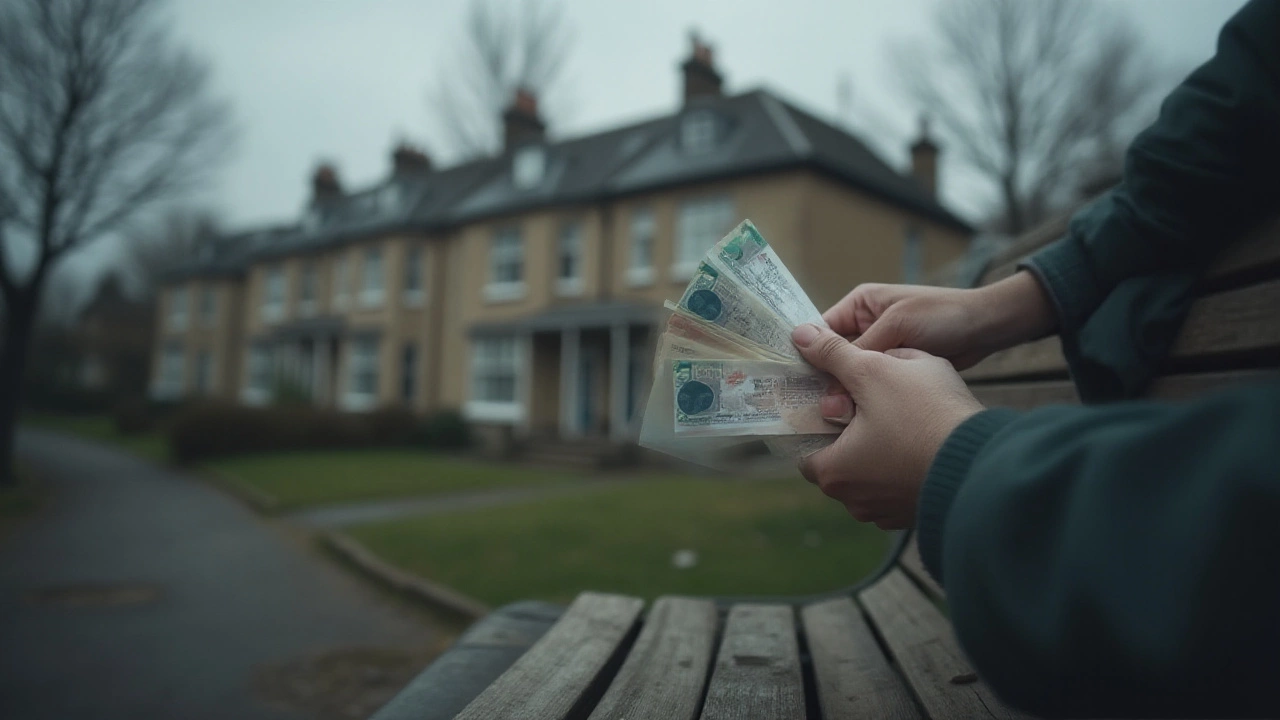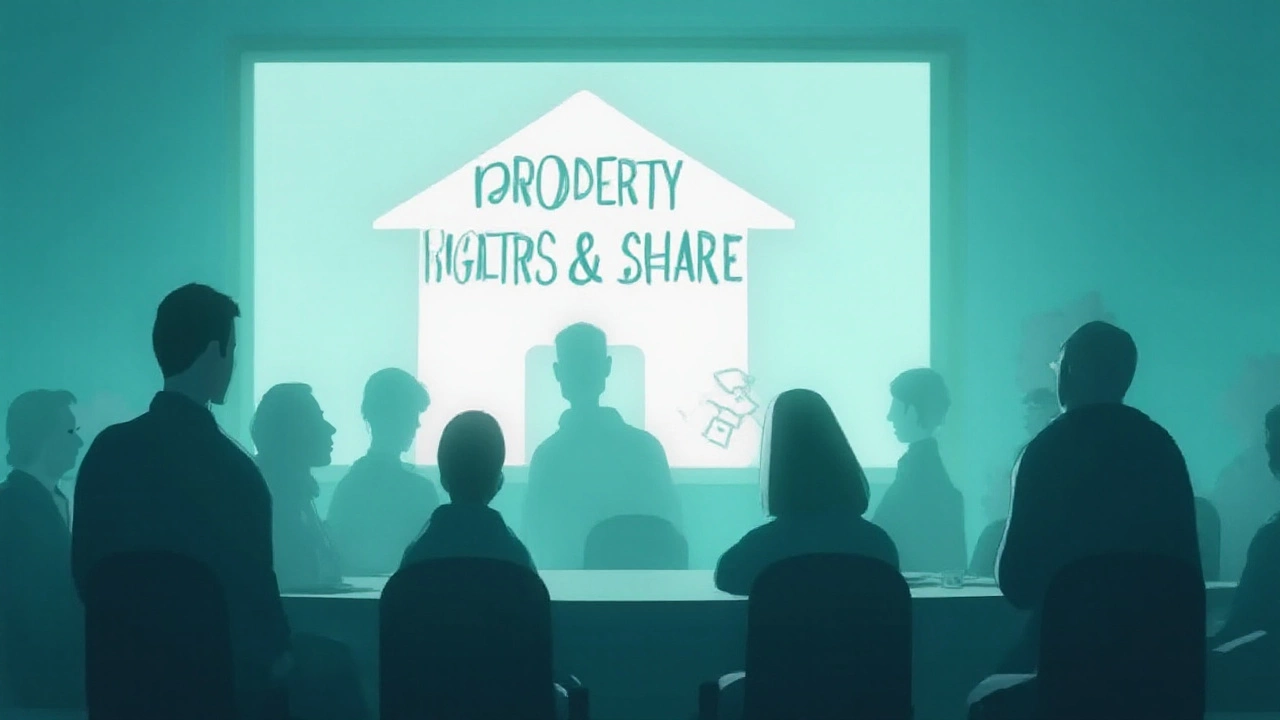Ever thought about telling your friends you own a place, only for them to ask, “So, how much do you actually own?” It’s a stumper, because with things like shared ownership, timeshares, or even buying shares in a real estate company, the line between 'owner' and 'investor' gets fuzzy fast. People imagine owning property as black and white: you’re either in or out. But the reality is messier, and in some cases, a single share could technically make you an owner—at least on paper. Let’s strip away the confusion and get straight to what it means to truly be an owner, how many shares it takes, and why the details matter way more than most folks realize.
What Counts as an Owner? Defining Ownership in the World of Shares
So, you’re thinking about buying in. Maybe it’s a glitzy new development, that quirky apartment block down the street, or shares in a real estate fund. The language alone can make your head spin. There’s outright ownership, shared ownership, leasehold, freehold—plus, property company stock, and the list goes on. But what does it actually mean to be an owner?
In legal terms, ownership comes down to who holds the rights in the property—often about deeds and titles. But when we talk about shares, especially in shared ownership schemes or commercial property investments, things aren’t that clear cut. In a shared ownership property, holding just 25% of the home gives you a contract that says yes, you’re an owner—and yes, you can even paint the kitchen bright yellow if you want (almost).
In England, for example, shared ownership lets you own between 10% and 75% of a property, with the rest rented from a housing association. Got 10%? You’re an owner. You have the right to live in the home, sell your share, or 'staircase'—buy more shares over time (the record for most staircasings in one London block? Nine, by the way). Even that smallest slice gives you legal owner rights, not just a rental contract. Your name is literally on the lease, and often, in the Land Registry.
It works differently if you’re buying shares in a real estate company or a property fund. One share in a REIT (Real Estate Investment Trust) or a property development company? Legally, you are an owner—the shareholder registers prove it. But it’s a far cry from picking wall paint or putting up a swingset out back, as you have no direct say in the day-to-day management or use of individual properties in the trust. The key takeaway is this: legally, even one share may give you the title of 'owner', but what you can actually do—and your feeling of control—rides on the rules laid out in your agreement or contract.
How Many Shares Do You Really Need? Breaking Down the Numbers
Let’s tackle the million-pound question: how many shares does it take to really count as an owner? If you go by pure technicality, just one. Every shared ownership scheme in the UK, Ireland, and much of Europe says you’re an owner from your very first share, even if it's only 10%. Buy one share in a property company, and you’ll get a fancy certificate calling you a shareholder-‘owner’. But the real-life impact is almost never that simple.
For most people, ownership isn’t just a rubber stamp—it’s also about rights, pride, and power. If you’ve only got a small percentage, don’t expect much when it comes to decision-making. In the UK’s shared ownership system, for example, you typically need to own over 50% of your home before you get full say in bigger decisions—like major refurbishments, subletting, or selling up entirely. And here’s a surprising bit: less than 15% of shared owners ever staircase all the way up to 100%, according to official data from 2023.
If it’s a company, the story gets trickier. Your power in a company is usually tied to voting rights, not just how many shares you have. Standard voting in public companies? One share, one vote. In smaller companies or co-ops, sometimes a threshold matters: say, 5%, 10% or 25% of total shares to propose resolutions or force meetings. Owning less than 1%? You’re technically an owner, but you’re not changing the world. Fun fact: in the largest UK REIT, British Land, owning 0.001% would cost you over £20,000 in shares (as of July 2025), but you still wouldn't have a major voice in company direction.
The short answer? Yes, one share can make you an owner. But if you want control or influence—say in a block of shared flats, or on the board of a property firm—think percentages that matter. Usually, real say starts kicking in once you hit those magic fraction points: 10%, 25%, 50%, or the full 100%. Everything below that and, yes, you’re on the list, but that’s about it. In a nutshell? Ownership starts with one share, but the real perks (and headaches) only show up as your share grows.

The Rights and Responsibilities That Come with Even a Single Share
Here’s where a lot of first-time buyers and investors trip up. Ownership isn't just about having your name on the paperwork—it comes with a bundle of rights, sure, but also a suitcase of responsibilities. Even with a tiny slice, you’re expected to play your part. Let’s talk specifics.
In a shared ownership scenario, grab your copy of the lease: pay attention to service charges (yep, you still pay these even if you own just 10%), maintenance fees, insurance obligations—you name it, your piece may be small, but your wallet still feels the pinch. In a 2024 survey, about 68% of UK shared owners said they were surprised by repair and management costs, even if they only owned a quarter of their property.
Then come rules for use and improvements. Want to renovate the bathroom, dig up the garden, let your cousin sublet for a year? Most leases spell it all out, and unless you’ve staircased to full ownership, the housing association often gets the final say. Miss any rules, and you risk fines or, in extreme cases, losing your share.
Owning shares in property companies or REITs? Expect less drama, but don’t think you’re invisible. You’re entitled to share in profits (dividends), get reports, and vote at annual meetings. Don’t ignore those AGM invites—after all, it’s your investment, even if your vote feels like a whisper at a rock concert. If the company liquidates? Shareholders get their cut only after everyone else in the payout line—think lenders and bondholders—gets their piece. That’s why knowing exactly what your 'ownership' guarantees is worth its weight in lawyer fees.
Parking all this into a table makes it clearer—here’s what comes with even the smallest share:
| Type of Share | Owner Rights | Owner Responsibilities |
|---|---|---|
| Shared Ownership (e.g., 10%) | Live in property, paint/decorate, sell share, staircase | Service charges, repairs, abide by lease, maintenance |
| Company Shares (e.g., 1 share) | Attend AGM, get reports, vote (usually 1 per share) | Keep informed, follow company rules, taxes on dividends |
Bottom line? Even a single share puts your name in the game—and makes you responsible, too. Don’t let the small print sneak past you.
Common Pitfalls and Sneaky Surprises for Small-Scale Owners
You’ve probably heard success stories—people who put in a small amount, watch their share grow, and suddenly they’re booking their retirement trip to Bali. But slow down. Getting even a little bit of ownership comes with tripwires that aren’t just ‘rich people’s problems’—they bite everyone. Here are some true-to-life stumbles many newbies don’t see coming.
Hidden fees. Shared ownership schemes look cheap on entry, but service charges and annual rent on the unsold portion hit your bank account like clockwork. In 2023, the average annual service charge for a London shared ownership flat topped £2,050. If you ever want to staircase up (buy more shares in your property), you’ll also have to pay for fresh valuations and legal fees each time–it’s not a one-and-done kind of move.
Resale headaches. Selling a small share in shared ownership isn’t like flipping a full property on the open market. Housing associations often have ‘first refusal’ rights, meaning they get a shot at buying back your share or finding a buyer through their own system. This can slow things down—9 out of 10 shared ownership sellers in a 2024 Homewise survey said they waited longer than six months to finalize a sale.
Limited say in big choices. Here’s a catch that stings: buy a small share in a property company, and don’t expect to be steering the ship. In most companies—especially big ones—tiny shareholders have little power to influence directors, policies, or strategy. For example, in the UK, you generally must have at least 5% of company shares to request a shareholder meeting. Kids glove treatment? Not really.
Unexpected tax twists. In some cases—including when holding shares in overseas estate companies—tiny owners get caught by inheritance tax or even capital gains, depending on how laws change. Governments tweak these rules often. In 2025, HMRC increased the reporting threshold for property gains, but most owners don't keep up with these changes. Better brush up, or talk to a financial advisor, before going all in—even with what seems like 'pocket change'.
Moral of the story? Even small stakes in property aren’t a hands-off deal. Check contracts, talk to current owners, and crunch all the numbers, not just upfront costs, before you call yourself an owner.

Tips for Picking the Right Path to Ownership
Ready to jump in? Don’t get lured in by glossy brochures and catchy ads alone. The best move is always to match your ambitions with the right way of owning shares. Here’s how to get smart about it:
- Work out what matters most: Is it having a home to live in, making investment gains, having a vote in how things run, or simply being able to say you’re an owner? This will drive your decision more than anything else.
- Crunch the numbers, honestly: We’re talking total cost of ownership. Not just the share price, but all extra costs—service charges, ground rents, stamp duty, renovations, and selling fees. Keep your eyes on the long-term picture.
- Know your exit plan: If you buy just 10% now, ask yourself how easy it will be to sell that share later—especially if you move for work or outgrow the space. Small shares can be harder to offload, as most buyers want at least 25% or 50% to make it worthwhile.
- Talk to a specialist: Get advice from solicitors or independent financial advisors who know shared ownership and fractional real estate. A quick chat could save you thousands—in stress or cash.
- Double-check the fine print: Always ask for the full contract and scrutinize terms around subletting, staircasing, altering the property, and resale. Less glamorous, sure, but nothing ruins new ownership like an awful surprise in the lease.
The property world is loaded with options, but few of them are 'set and forget.' **Shared ownership** can get you onto the ladder fast, but don’t ignore traditional outright purchase, rent-to-buy, or co-ops. If you’re chasing returns, property funds can make sense, but know your vote there matters little. Tech platforms selling fractional investments are hot in 2025; just remember that in spite of the hype, the basics—cost, rights, and responsibilities—don’t change.
